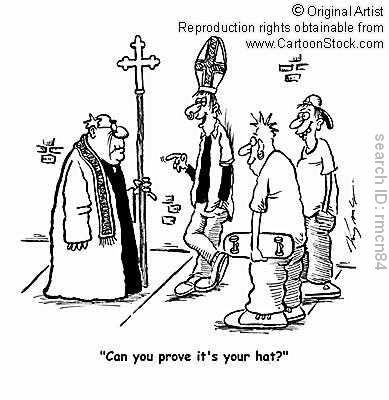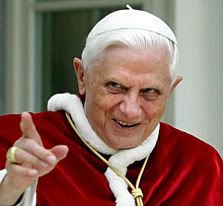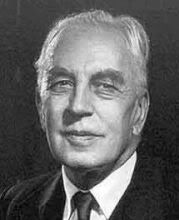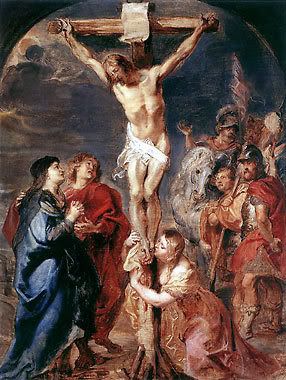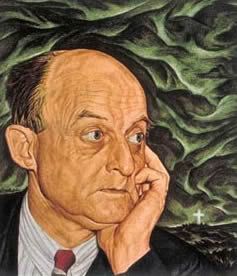
Reinhold Neibuhr
St. Augustine and Reinhold Neibhur, those scandalous liberals! Toward a Third way in the Culture Wars.
St. Augustine's name always comes up when feminists attack church fathers who said sexist things. By all accounts Augustine seems to have been one of the worst offenders. I've tired to point out to many feminists, of both secular and Christian ilk, that Augie's words defended by feminist philosopher Geneva Lloyd in The Man Of Reason. Augustine was using some bizarre metaphorical reasoning and only used Eve as a derivation from Adam symbolically. But no one cares. It's so much easier just to write Augie off as a dead white male church guy who said stupid sexist things, let it go at that. Oddly enough even Augustine's best friends are not that willing to support everything he said. At one point my favorite prof. at Perkins, and good friend William S. Babcock (major Augustine scholar) remarked "you don't have to accept it just because Augustine said it, in fact if Augustine said it there's a good change its wrong." I think we were talking about free will at the time. But be that as it may, Augustine is loved by the right wing politicos of the Catholic church because he is used (wrongly) by a scholar name O'Connell to bolster the double edge sword of civil and religious authority; these hacks somehow think that this gives them the green light on their own social agenda. The deep irony here on both sides is that if one understood what Augustine really says in his massive tome The City of God (which was really just a letter to afferent, but thinker than the NY phone book) one would have to conclude that Austine should be a comfort as well as a caution to sides, the left and the right.
The City of God was written in response to the sacking of Rome by the Barbaric hordes in 410 AD. This situation left Christians in a dyer situation, since the Roman state under Constantine had worked up a connection between Christianity and God's blessing on the state that supported it. Constantine PR man Eusebuis had so inculcated the idea that God was blessing Rome because it was turing to Christ, that Roman Christians had come to understand that their well being and the success of the Empire was all linked in support of the Christian agenda. All of this can be seen in elaborate detail in one my favorite books of all time, Christianity in Classical Culture, by Charles Norris Corcoran. It's an old book, written in the late 40's, Corcoran was at university of Toronto. He has a tendency to make certain aspects of the Rome of St. Augustine analogue to the cold war of the 1940s, viewing Constantine as a mild social democ rat of somewhat liberal flavor--at least in terms of social programs. Another excellent and more up to date book which lays out a similar line of thinking is Christianity in the Roman World By S. Markus.
The Christians of early fifth century Rome had come to be very selfish in their outlook. They saw themselves as God's chosen people, they alone had been given the right to extort obedience from other nations because they were doing God's will. Of course this was nothing more than the same old political philosophy of the Cesar who came before, the reason of state argument. Constantine merely revitalization it in order to give the Roman morale a new shot in the arm. In the old pagan configuration, the Cesars were adding other nations to the matrix of civilization, doing them great favor by conquest, in spite of their ungrateful refusal to be taken. Constantine merely expanded this role, not only were they incorporating other people's into the matrix of civilization, (Corcoran' term, nothing to do with the movie) but they where also making the way clear for people to hear the Gospel, thus saving souls and expanding the kingdom. The Christians of that era came to understand their material success to be a direct blessing from God in exchange for their support of the political agenda.
The sack of Rome came as terrible news to these Christians, because suddenly God had withdrawn his favor. The pagans capitalized on this mishap by arguing that the old gods of Olympus had punished Rome for turning away from them. The Christians really had no answer because they had come to think so clearly that material reaches meant divine favor. The destruction of material riches had to mean the removal of God's favor, or perhaps even the triumph or another god? Of course, the City of God is as thick as the New York Phone book, so pardon me if I give the short version: basically, Augustine argues that no temporal power arrangement can claim to be the city of God. Temporal power is an earthly thing it belongs to the city of man. The city of God and the City of Man are made for two different purposes and they have two different ends. The City of Man is Temporal and fleeting. It is not permanent and it is not holy. The City of God is permanent and Holy, and though the two exist one inside the other, the City of God inside the City of man, the City of God is everlasting and the City of man is not. Thus the temporal power can never claim to be the City of God. That means that Constantine did not set up a Christian state, and that Rome was never the commonwealth of God. No political agenda can ever be sacred and no temporal seat of power can ever claim to be the work of God on earth. Augustine totally bores the connection between temporal rewards and material success and eternal destiny.
Augustine was also a major influence upon modern political thinker and theologian Reinhold Neibuhr. Neibuhr is, oddly enough, another misunderstood figure who has been cast in the role of "neo-liberal." Far from being Neo-anything, Neibuhr was a define socialist until the day he died. I know this to be the case through my own association with his friend Frederic Carney. Neibuhr applied Augustine dictum to modern cold war politics. While he did write "why is commission so evil?" and he was too slow in denouncing the warin Vietnam (waiting until almost the day he died in 1971) he was a tireless advocate of whomever needed advocating. He not ony wrotet "why is communism So Evil?" But the also went to bat to help defend the defendants in the Dennis vs. United States case, because he felt hat those representatives of the Communist Party USA were being rail-roadbed. Neibhur did not allow himself to be standoffish about the people he helped, and he did not try to enshrine the American effort in the cold war on the grounds that "we have to be as bad as they are to fight communism." His work Moral Man and Immoral Society pointed out the danger in thinking pointed to the errors in human wisdom when we try to project our own personal morality onto the group. We always wind up supporting things as a group that we would never condone as individuals, because we internalize the group interest and that overshadows our ability to think as free moral agents.
Neibuhr tried to cut a third course through the mine field of the American cold war politics. In the 1950s he fought a journal war against Billy Graham over the issue of Grham's anti-commuist crusades. Grham argued that all one needed was a McCarthy like anti-communism and the "simple answer of the Gospel" and one could beat communism. Neibuhr argued that Graham's approach was simple minded; that we needed keen political analysis, and answer to social ills on our own side, and a more complex message than going down to the front at a Graham crusade. Graham won the war in the popular mind because it was easier for the common man to identify with him and his answers seemed more "clear cut" (if not more simplistic). Neibuhr, of course, won the respect of his colleagues for standing up to the crwod, there was never any danger of Billy Graham besting Reinhold Neibuhr in an intellectual debate, but this was the MacCarthy era. Neibhur's attempt at steering a third course (Debsian socialism is socialism but divorced from Marxist Leninist philosophy) never panned out in the American mind. The cold war sucked all other forms of thinking into a black hole in which it was possible only to be community, or anti-communist. There were other attempts at a third way, however, but they wound up in the same swamp of indifference. The Papal office tried through several Popes to run a third way political solution through Christian Democrat parties. This met with mixed results, sometimes good government in West Germany, sometimes support for the death Squads in El Salvador. Overall the Pope (JPII) had much more success helping to destabilize communism than he did in founding a third way.
But what other avenue should we expect in the political arena? We should expect to fail to starting a concrete third alternative since that would mean setting up a new agenda for temporal power. The strength of the City of God (the Kingdom of God) does not arize from temporal political power. The chruch is a priori the third way. When we try to forge a concrete political alliance by uniting the Gospel to anyone political agenda we miss the point and merely re-create Constantin's mistake.The City of God is not about holding temporal power, the city of man is not the city of God and cannot claim to have the anointing of God. No political party can claim to be the part of God; and by contrast, the other party is not the "party of sin." Both or all political parties are just confused humans looking for historically bound power arrangements and hoping desperately that this will make their lives better. In some senses it will, it will also make something worse. These are unavoidable realities of the world. We cannot cast the aura of the sacred over the temporal and claim victory foe the Kingdom of God!
Now we are ensconced in a kind of cold war in the church. Another enemy has been thrust upon us, one we don't' understand very well, but it remains to be seen what becomes of that conflict. But in the church the new cold war is not about that, it is about the social changes inaugurated in the 1960s which still continue today; it is about the Reagan era and the moral majority and the new republican party which somehow never quite says it is the party of God, but somehow one gets that feeling. The cold war is the culture war, "liberal" vs. "conservative." But for "liberal" read, pro gay, pro feminist, pro abortion, for "conservative" read prayer in schools, teaching creationism in schools, keeping gays and feminists out of everything and supposedly ending abortion; the short answer; Democrat vs. Republican, blue country vs. Red country. The blue/red split in the church (it's so confusing being blue after being red so long) is mainly about the role of women and gays. These are the issues that seem galvanism both sides.
Liberals are so despised and rejected by American society that there isn't a single liberal talk show on PBS. Charley Rose is what passes for a liberal and he is an avoid conservative Republican who openly camping for Reagan. Somehow, he is what passes for liberal, and he actually does a pretty good job of substituting for one. The media is reviled by the conservatives as the "dreaded liberal media" but if one were to read Noam Chomsky books one would see what a joke that is (Manufacturing Consent). There are two media watchdog groups, one left, (FAIR, Fairness and Accuracy in Reporting) one Right (AIM, Accuracy in Media). Having studied both and having been a local organizer for FAIR my own bias is that FAIR makes a much better case for a conservative media than does AIM for a liberal media. The media is solidly in the hands of the conservatives, especially the news media. About the only place "liberals" really rule in the media now are on cit cons, where the husband is always a bumbling fool and the wife is the only competent person and the husband is a bit afraid of her and she's always proven right. The liberal tinge to the cultural side of the meida is probalby wht leads many think of the media as liberal. But that is just what Marcuse called the "carnation on the lapell of capitalism."
The Evangelical movement, since tasting real political power a couple of times, well almost, have become more despondent and feel more surrounded than ever before. Seeing the utter failure of the old patriarchal hierarchy in Western civilization they founder and desperately grab at deck chairs while the vast unsinkable titanic of guideline Age America goes under. Of course this means in reality that they are closer to political control than ever. The only way to get a conservative to move into political action is to convenes him that he's surrounded. So the more defeated and desperate the conservatives believe their cause to be, the more one can be sure they are winning. But the outcome either way will be bad for the Gospel. The Gospel is not the city of man. Taking temporal power can never be the fulfillment of God's will, not in the long run.
The Gospel should always be the third way. It was the third way when it came out in the time of Christ; neither Jew nor Greek. In other words, not Hebrew and not pagan. It was the third way in the cold war, as there was a vast Christian left history which is usually pretty much ignored and unknown in conservative churches, but it still exists. Figures like Dorothy Day and Mother Jones were real Christians and really did fight for workers and the poor. The Gospel must be the third way because it is not the City of Man, it cannot be a temporal political agenda, and the temporal political power cannot be confused with the gospel doctrine and moral view points are essential in following the Gospel, but the Gospel is much more than just sound doctrine. There is also the matter of living out our sound doctrine and how we treat people is a large part of that.
We cannot make a Christian Democrat party, as some have tried, because that's jut playing the world's game. To be effective in helping people in the world for the Gospel, we can at times enter the political arena. We can enter on either side, and we should never lose sight of the fact that real Christians who really love the Lord are on both sides. Neibuhr once said that we demonize the other because we see in him our own temporal minded pretensions. We must remember as we play the politics game that the other guy is playing the same game, he/she may have the same motives we have and we must recognized that fact. That realization could be to laud the other, or it could be to convict ourselves. We must take seriously Paul's talk about party spirit and realize that this is never more a danger than when one becomes involved in political parties.

